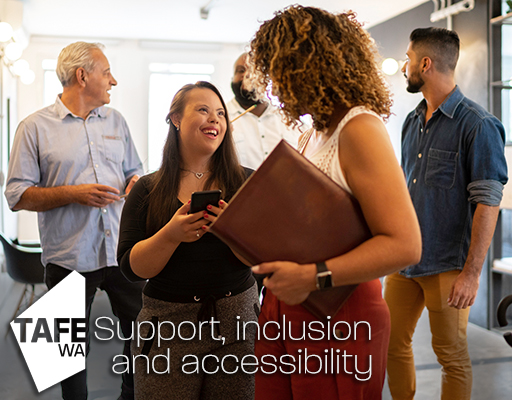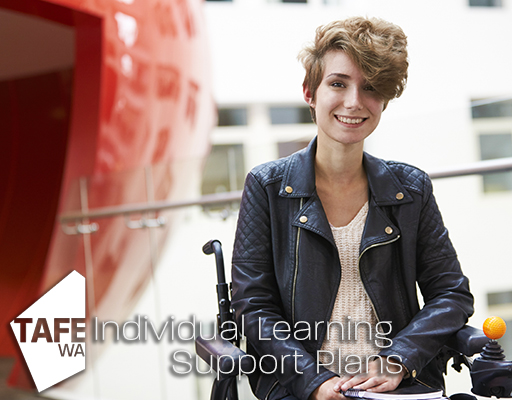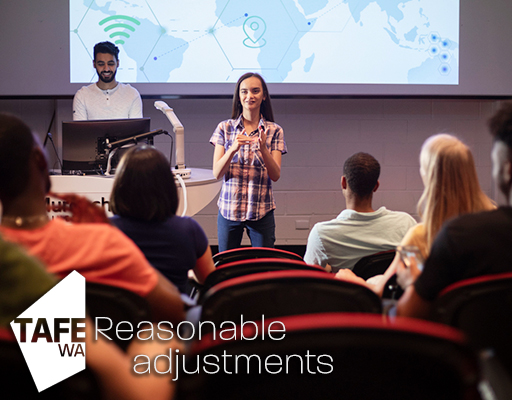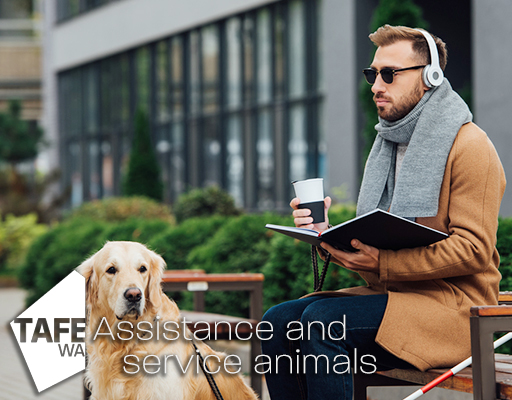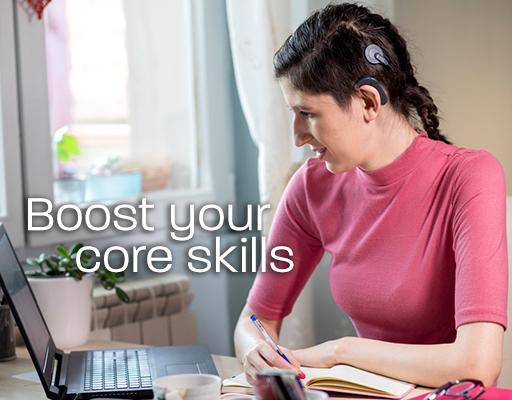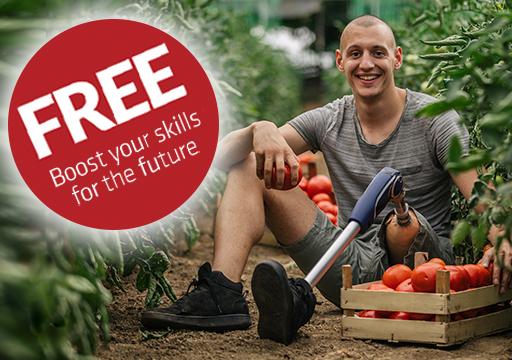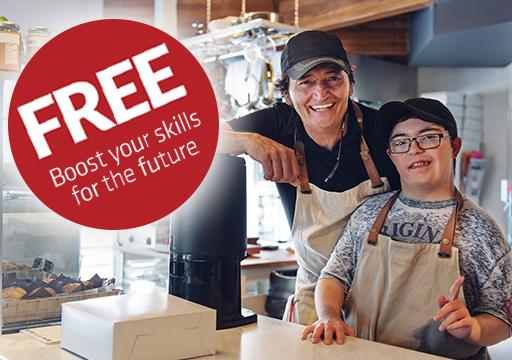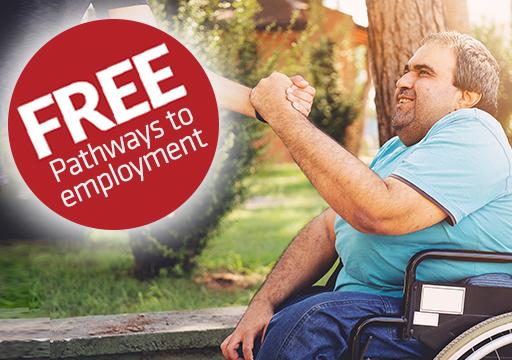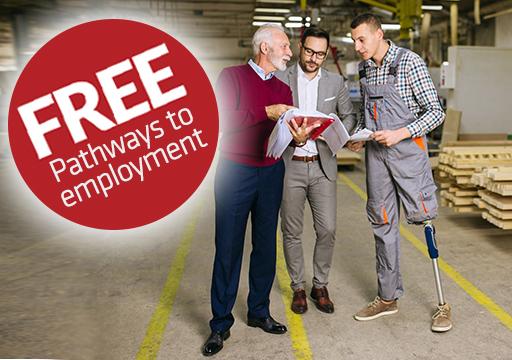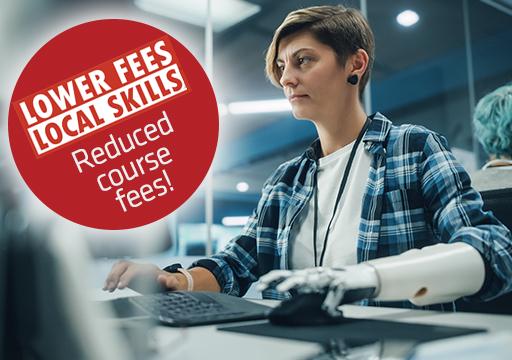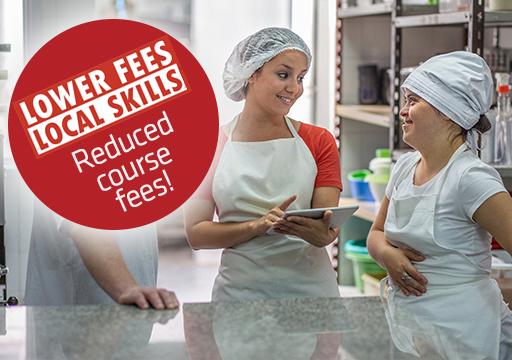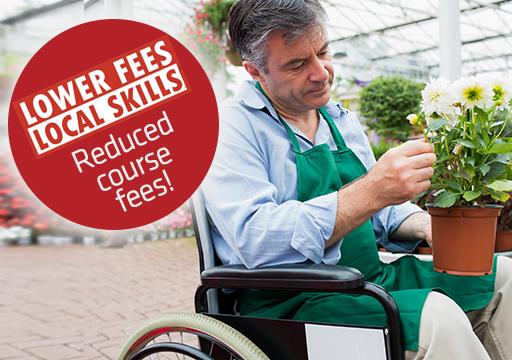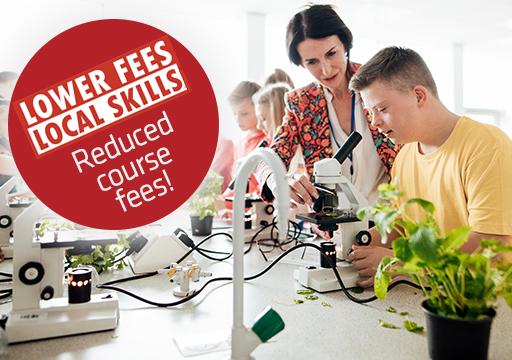There's never been a better time to get into the workforce — your skills and expertise are valuable and needed by employers!
We know you have so much to offer – more than you may realise. Just bring your life experience, and we'll help you turn it into new opportunities!
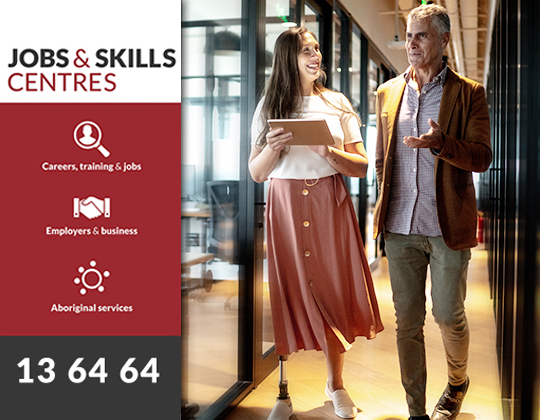
Free and friendly advice
A friendly careers specialist at your local Jobs and Skills Centre can help you translate your life experiences and skills into job ready skills and knowledge— whether it's a new job, starting training, or career planning support — your local JSC can help. And all services are free!
If you're not sure how to get started...
To get one-on-one assistance that can boost your confidence to take those first steps, reach out to your local Jobs and Skills Centre today. They're located across Perth and regional WA, and all services are free.
Supporting your goals: Getting into training
All TAFE colleges in Western Australia welcome students of all abilities, and promote an accessible and inclusive learning environment to ensure students with disability are supported at all stages of their training experience — from advice and information about training options, through to the enrolment process and all aspects of training delivery and assessment. Browse through the five slides below, to find out more.
There's no limit to what you can achieve!

Deanna Scorda
Traineeship: Certificate III in Government
"Having a disability has trained me to be able to solve problems, think flexibly and efficiently, empathise, and represent people from all walks of life.
When speaking to others interested in doing a traineeship, I encourage them to give it a go as it is a great way to enter the workforce and learn from other staff who have much knowledge and experience to share. and experience to share.
My education has led me to build my self esteem, get a permanent job, meet financial commitments and plan further career and personal goals."

Trent Caldwell
WA Training Awards Vocational Student of the Year 2021
"I had a freak accident when I was 19. I had to learn to walk and talk again, lost all sight in one of my eyes, acquired ADHD, epilepsy, and mental illnesses. After that, I wanted a career I could be passionate about, so I went for a Diploma in Marketing and Communications.
I hit many walls, but my lecturers sat down with me and encouraged me to continue — offered support, flexibility and care. If you want something, chase it.
You’ll have to work for it, but it will pay off. "

Georgia Potts
Certificate IV in Education Support
Education Assistant in a pre-primary school
"Being diagnosed with Dyslexia at age 8, I had always struggled with my education, I loved learning and was so passionate about it, but I had to work so much harder to achieve my personal goals. Having support and building positive self confidence is so important for us all, to create successful futures in whatever that may be.
Through the successful achievement of my studies I was able to gain permanent employment. Today I am deeply passionate about supporting and giving students an equal opportunity to learn and feel safe, this is so important for our community as a whole."

Ready for new opportunities?
As a first step, it's worth taking the time to work out what skills, abilities and experience you already have — you may have more than you know!
Skills can come from all of your life, work, learning and leisure activities – and many of the skills that you have are exactly what employers are looking for. Even skills that you may not think are work related, can be directly transferrable to a job or occupation. There's also employability skills, which are a set of skills required across all industries and types of work — these are things like communication, teamwork, and problem solving.
Here's just a few examples of how your life experience translates directly to employability skills.
| What you've been doing | What skills and knowledge you could have |
|---|---|
| Travelling | Flexibility, planning and organising, time management, budget management, language/s, communication skills, negotiation skills, decision making |
| Leisure activities (sports, gaming etc) | Physical flexibility; creative thinking; teamwork; problem solving; communication skills; decision making; negotiation skills; conflict resolution; analytical skills; leadership; initiative |
| Computing | Digital literacy; technical skills; decision making; problem solving |
| Being on committees | Teamwork; listening skills; verbal communication skills; business documents and practices; budgeting and financial management; negotiation and conflict resolution; decision making; problem solving; time management; planning and organising; leadership |
| Hanging out with friends | Teamwork; listening skills; verbal communication skills; negotiation and conflict resolution; decision making; problem solving; leadership; interpersonal skills |
| Cooking and home duties | Food preparation and safety; nutrition; kitchen and cooking skills; cleaning; maintenance; planning and organising; time management |
| Being a parent | Communication skills; listening; negotiation and conflict resolution; problem solving; decision making; creative thinking; first aid; time management; planning and organising; leadership; teamwork |
| Volunteering | Depending on the type of volunteering you have done, this could be a long list! Think about teamwork; communication skills; time management; decision making; negotiation and problem solving; business documents; business practices; customer service and leadership |
There are just a few examples, but never think that you have been "not doing much" because you haven't been in paid employment... think about all aspects of what you do, and what you know, and how they relate to the kind of skills valued in the workplace.
Useful resources
To help get you take stock of your life experiences and how they relate to employability skills, the following resources may be useful. You can find them all here
| Template: Recognising skills and abilities | Discover the skills and abilities that you already have |
| Checklist: Personal and transferable skills | This checklist will help you identify skills that are transferrable to the workplace |
| Fact sheet: Employability skills | Discover what skills you already have that are important to most employers |
| Template: Your action plan | Get started on your own career action plan and start setting goals for your future |
Boost your core skills
It's exciting to think about all of the opportunities ahead! You want to make sure you give yourself the best possible chance for success, so you may need to think about give your core skills a boost.
- You may feel that your English reading and writing skills aren't quite as strong as they need to be to get a job or get into training.
- Or maybe you would like to boost your maths skills?
- Are you confident using digital technology?
- Perhaps you need some support to be able to access training?
We offer Foundation Skills and Equity courses which focus on language, literacy and numeracy; and employability skills such as teamwork, problem solving, self-management, digital literacy and using technology – all key skills requirements for success in both training and the workplace.
We also offer a range of learning support options available through our Participation—Equity programs, where you may be eligible to receive:
- assistance with language and literacy;
- assistance with translation and language;
- mentoring and counselling; and
- assistance with things like meals, transport and child care.

Why join the workforce?
Being part of the workforce here in Western Australia offers you many benefits, and there's also some great reasons why WA businesses would love to see you get into the workforce!
You are needed!
Every person brings skills and abilities to the workplace, based on their work and life experiences. As a person with disability, you have unique skills and abilities to offer and will be highly valued as part of an inclusive and diverse workforce.
Employers say that people with disability are able to perform equally as well as other employees, and are positive and productive team members. You are also able to offer perspectives that others don't have, and this leads to positive conversations and better understandings for the workplace when it comes to inclusivity and diversity.
Disability is far from a barrier! Smart employers know the value of experience — know your worth!
Browse our occupation profiles and see what jobs interest you
We have hundreds of occupation profiles you can browse to find out about job responsibilities, working conditions, and training you may need.
Using the occupation profiles search
As this list contains hundreds of occupation profiles, you can search by keyword, or by letter A—Z.
Industry area
Use this filter to search within a specific industry.
Once you have found occupations that interest you, you could conduct more detailed research into those careers — for example; talking with people who work in that industry.
It's your time now
This is time for you to focus on "me" — what you want to do, and what your goals are. There may be new things to consider if you'll be balancing other responsibilities, but many employers offer flexible working hours and conditions that make this easier.
Change can be very stimulating, like recharging your brain! Be confident in your skills and abilities — nobody likes to feel like they're in a rut, so getting back into work may be just the change you need.
Breaking barriers
We hear this saying a lot, but it is something to be aware of — you'll be meeting people who maybe have never known a person living with disability, and may have some incorrect perceptions about ability. And you have an opportunity to inspire others to go for their goals!
Financial independence and less money worries
Getting into paid work means more financial independence for yourself, and less money-related stress. Whether you want to work part time to help with bills or spending money, or get back into a full career with a nice salary, it's a great feeling to have that financial support!
Family-friendly flexibility
More workplaces than ever are now embracing the idea of family-friendly work environments, and allow you flexibility over when, where, and how your work is accomplished. In fact; there's actually workplace legislation that encourages it! And working from home options are now becoming more available, which is a great help with the work-life balance and can ease the challenges of getting to and from the workplace every day.
Learning new things
Joining the workforce opens up a whole world of learning — new skills, new experiences, new people — it can give you a whole new energy!
Gaining new skills and developing your knowledge through training is another great way to progress towards a career. If you're skilling up, most TAFEs and training providers offer delivery options to suit all kinds of schedules. These include on campus, full or part time, flexible delivery outside of business hours, online learning, or via virtual classrooms!
Social and networking benefits
We sometimes don't really think that work equals friends, but most people have at least one friend at work. Some of us even have a workplace best friend! Getting back into the workforce will introduce you to new people, who can enrich your life. Working can also help you to build a professional network, which is a great way to enhance future career prospects.
Sense of accomplishment
Sometimes you just want something for yourself — something that you are achieving, reaching your own goals. Returning to the workforce can give you a fantastic feeling of pride and accomplishment. Even if you just start with small steps — maybe a low stress part time job — it feels good to know you're moving forward in a positive direction.
Our free online jobs board
We have a free online jobs board, with a great range of jobs available — from entry level through to higher level career opportunities — maybe your dream job is on there right now! It's completely free to use.

Jobs and Skills Centres work closely with employers, business owners and industry across WA to find employment opportunities, including apprenticeships and traineeships, and post them to the jobs board. You can use the filters to search for specific jobs, and in different locations.
When you see a vacancy on the board that interests you, select the title to read more about the job and how to apply.
If you would like some assistance using the jobs board, or to update your CV/resumé and write an application, your local Jobs and Skills Centre can help.

Options to skill up
If you're keen to jump into work with a new occupation, or you need to skill up and build some confidence before you're ready to get into the workforce, we've got some great options for you!
We have free short course skill sets, targeted to specific job ready skills that can give you a head start on getting a job; job ready programs that include work experience so you gain real hands on experience; pre-traineeships and pre-apprenticeships to help you get an apprenticeship or traineeship; and full qualifications with course fees reduced by up to 72 per cent.
Plus we have support available to help you get into training, and specialised support programs if you would like to build some job ready skills. You can also get free advice and information about training at your local Jobs and Skills Centre.
Free short courses: Job Ready skill sets
Our range of Job Ready skill sets have been developed in consultation with businesses and employers to deliver fast track training that will get you skills ready for jobs. They are available in areas including hospitality, aged care, healthcare, retail, business, cyber security, green jobs, pool lifeguard, small business, agriculture, heavy haulage driving, mental health, construction, and many more.
Whether you're looking for a skills refresher or an introduction to a new field of work, these skill sets will bridge any gaps in your knowledge without too much of a time commitment — most run for only a few weeks and are available part time, and some can be done online. All the skill sets contain units from nationally accredited and recognised vocational education and training (VET) qualifications.
Some of these skill sets are 100% free for everyone, and others are 100% free for eligible persons including people aged 15—24; jobseekers; and people holding a pensioner concession or Health Care Card.
Job Ready Programs — Pathways to employment
Are you looking for work, but need some skills and experience? How would you like to get on a pathway to employment, through a program that combines training and on the job industry experience? Plus opportunities to connect with a job, an apprenticeship, traineeship, or further training and employment? Right now there's many new programs and projects all across Western Australia, creating a pipeline of work and fantastic job opportunities in a range of industries, and our Job Ready programs can give you a head start!
There's never been a better time to get on a pathway to employment, and we want to help you take advantage of all these opportunities! Our Job Ready Programs are short courses that combine training at a TAFE college or private training provider, with a period of industry placement where you'll gain real hands on experience in the workplace.
The programs are available in a range of industry areas where the jobs are — including aged care, disability support, and building and construction — and they're 100% free for eligible students including people aged 15—24; jobseekers; and people holding a pensioner concession or Health Care Card.
Qualifications with course fees reduced by half or more
For some jobs or career goals, you'll need to have a full qualification. The good news is we have reduced the course fees* by up to 72 per cent on 210 qualifications for areas where skilled workers are in demand, to help you take advantage of these job opportunities!
Course fees are capped at only $400 annually for eligible students!
That means that concession-eligible students won't pay any more than $400 in course fees*, no matter what they actually add up to — this can save you hundreds of dollars! The $400 annual fees cap is available for people aged 15—24; jobseekers; people receiving Youth Allowance, AUSTUDY or ABSTUDY, and persons holding a pensioner concession or Health Care Card. The annual course fees cap is $1,200 for non-concession eligible students.
These reduced-fee qualifications are part of our Lower fees, local skills program, and they're available from selected TAFE colleges and private training providers across Western Australia.
With a range of low fee qualifications to choose from, there's something for everyone — from automotive to aged care, tourism and hospitality to information technology, childcare to agriculture, pastry chef to viticulture, building and construction to electrical engineering, science, veterinary nursing, web design and development... too many to list here!
These are all nationally recognised and accredited qualifications. And remember, eligible students won't pay more than $400 in course fees for any of them! We have details about these reduced-fee Lower fees, local skills qualifications and how the annual fees cap works, plus a full list of what's available, on our Fee free and low fee page.
*The fee reduction and annual fees cap applies to course fees only — other fees may apply. Please visit the Fee free and low fee page for full details.
Apprenticeships and traineeships
Doing an apprenticeship or a traineeship enables you to earn while you learn — you work and get paid, just like a regular employee, but you also complete a vocational education and training (VET) qualification.
Apprenticeships focus on licensed trades areas such as bricklaying, engineering, plumbing, hairdressing, mechanical, electrical etc.
Traineeships are generally for non-trade areas such as information technology, business, aged care and retail.
Pre-apprenticeships and pre-traineeships are designed to give you introductory-level skills and experience, to help you get into a full apprenticeship or traineeship.
The training component is delivered through a mix of on the job learning, and formal training with a TAFE college or training provider.
You can find out more about apprenticeships and traineeships here

Free advice, information and support
If you're motivated to make a move, but need some friendly advice around getting into training or a job — in a way that works for you — our Jobs and Skills Centres can help. They can also help with decisions about training options, if you need to skill up.
If you're not sure how to get started – reach out!
JSCs are located across Perth and throughout regional WA. The best part is, all the services they offer are free! From information and advice about training courses, through to help with job seeking and career planning, they are ready to help. Call your local Jobs and Skills Centre for a chat, or find your nearest centre and stop by.



